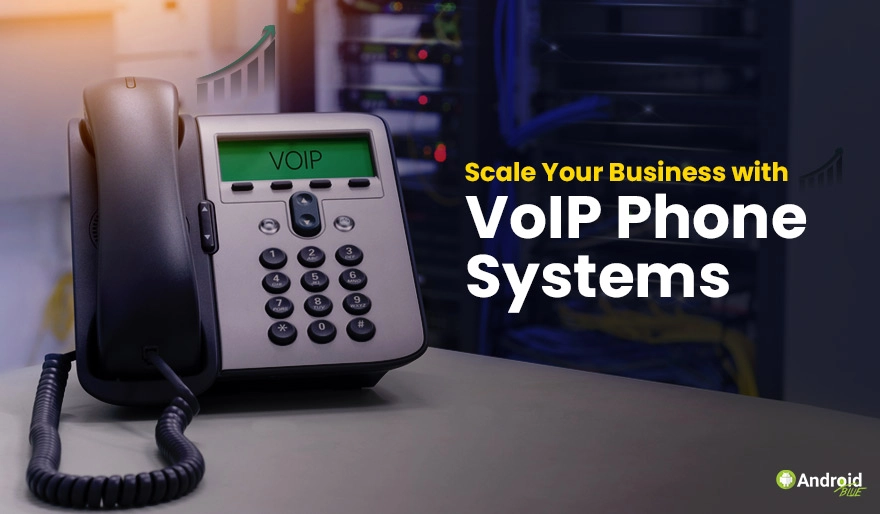How to Save Costs and Scale Your Business with VoIP Phone Systems
19 min read A VoIP phone system is the correct choice that helps to save costs and scale your business easily. In this article, we will provide you with all the necessary information about VoIP phone systems and the benefits and ways to scale your business. August 27, 2023 10:50
Are you looking for a way to save costs on your business phone system? Do you want to scale your business with minimal effort?If yes, then you’ve come to the perfect place.
A VoIP phone system is the correct choice that helps to save costs and scale your business easily. In this article, we will provide you with all the necessary information about VoIP phone systems and the benefits and ways to scale your business.
Let's get started!
The Benefits of VoIP Phone Systems
The Benefits of VoIP Phone Systems extend far beyond traditional communication methods, some of the benefits include.
Cost-Effectiveness
No matter the size of your business, implementing a VoIP system for your business can reduce business expenses. VoIP phone system does not require complex hardware, or wired setups so it reduces hardware costs.
A VoIP phone system uses the internet to transmit calls reducing international roaming charges and calling expenses. Also using a VoIP phone system you don't have to worry about recurring expenses like taxes, repair, and maintenance fees.
Scalability and Flexibility
Another great advantage you can get from using VoIP phone number on a business phone system is enhanced scalability and flexibility. You can easily scale phone systems as it works virtually and doesn't have to worry about the hassle of adding or removing hardware equipment. It is a great phone system for businesses to anticipate growth or have fluctuating communication needs.
Since VoIP is completely based on the internet, it provides great flexibility for remote working. It facilitates geographical independence, facilitates remote work, for remote and traveling events. Businesses can enhance collaboration, optimize communication, and adapt to the operations changes according to the needs.
Advanced Features and Functionality
Virtual business phone systems come with advanced features and functionalities that help business to simplify their communications.
No matter the size of your business it gives you enterprise-level experience for communications. Its VoIP call center software with the integrate with Noise Cancelling App makes your business approachable, due to its IVR, Call Routing, Call recording, Customized greetings, and several other features. VoIp phone systems also have analytics and reporting that helps to grow their business. It helps businesses make informed decisions, optimize communication strategies, and enhance customer interactions.
Reduced Manpower
VoIP phone systems can help businesses to reduce manpower by eliminating the need for expensive hardware, reducing the number of phone lines, enabling remote work, and automating tasks. There is no need for a physical PBX box, multiple phone lines, and automated tasks. It is a completely software-based system, and with fewer agents, you can run your business efficiently.
Integration and unified communications
VoIP phone systems offer a range of benefits, including integration and unified communications. This allows businesses to combine their voice, video, and data communication into one platform for more efficient collaboration.
It also reduces the need for multiple applications while providing enhanced features such as call forwarding, conference calling, and voicemail-to-email services. VoIP phone systems are also cost-effective since they do not require expensive hardware or additional software licensing fees.
Furthermore, it is easier to scale up or down with VoIP than traditional telephone networks due to its flexible architecture which makes it ideal for small business owners looking to expand without breaking the bank. Finally, most VoIP providers provide 24/7 customer support so users can easily get help when needed
Easy Maintainance
Virtual phone systems are a great way to save money and keep communication running smoothly. They require less maintenance than traditional landline systems, as they use digital technology instead of physical wires.
This makes it easier for businesses to quickly troubleshoot any issues that may arise w without having to call in an expensive technician or replace costly hardware components. Additionally, VoIP phones can be easily scaled up or down depending on the needs of the business, making them highly cost-effective and easy to maintain over time. How to Save Costs with VoIP Phone Systems?
Here are some ideas to take advantage of virtual business phone systems.
Choose the Right Plan and Provider:
Research and compare different VoIP service providers to find a plan that aligns with your business needs. Look for providers that offer flexible pricing options, unlimited calling plans, and features tailored to your specific requirements.
Reduced Infrastructure Costs
With traditional landline phone systems, businesses need extra infrastructure such as wiring or cabling. Traditional phone lines require more physical space but also increase maintenance expenses because they need regular upkeep.
VoIP phones make all these worries go away since they use existing internet connections instead of dedicated lines. VoIP phone systems allow you to make phone calls without a SIM Card or bulky and expensive telephony hardware. You can just use an internet connected device and a softphone app to make phone calls and send text messages. Thus, you can save your overall business costs with a virtual phone system.
Lower international Call Costs
Traditional international calling rates are quite expensive compared to modern VoIP providers. As a business owner, you can have international clients and to contact them, it will be expensive. Using a VoIP system could help lower call charges significantly while still providing crystal-clear audio quality.
Reduce IT Costs
Another major benefit of switching from traditional landlines is reducing IT support requirements. Since most modern VoIP solutions come preconfigured out-of-the-box with no complicated setup processes involved at all. This means less time spent troubleshooting issues related specifically related to setting up new equipment/services etc. It helps translate into fewer manhours required from an IT perspective which ultimately saves money.
Limit Unnecessary Features
Many companies choose packages full of features they don’t really need. However, this often leads them to pay more than what's necessary without getting much value out of it. To avoid wasting resources like this, take some time beforehand to assess exactly what kind of functionality will work best for each employee & department before signing onto anything else.
Data Compression
It costs a lot when you transfer a large amount of data through the Internet. You should use reduce bandwidth consumption & improve sound quality during calls. A lot of data compression techniques available today allow users to compress files. using this method businesses can cut back on networking expenses associated with large file transfers
How to Scale Your Business with VoIP Phone Systems?
A virtual phone system is preferred by most businesses due to its high scalability. Here are some ideas to scale our business using the VoIP platform.
Evaluate Current and Future Needs
Before investing in any new technology, it’s important to evaluate both the current and future needs of the company. Consider what features are currently needed by employees such as call forwarding or voicemail transcription services.
Do you need additional lines or extensions for remote workers? Assessing these needs will help inform which type of system best fits the organization’s goals now and in the future.
Easy Expansion
In today's business environment, where employees work remotely, they need to have a reliable way to remain connected when scalability is required with VoIP Phone Systems.
Access mobile apps or web portals from anywhere at any time. This allows teams to remain connected even if they aren't physically in one place
Remote Work Support
Remote working is a reliable way for employees to stay connected and is essential when scaling up operations using VoIP Phone Systems. Look into options that allow users access from anywhere at any time via mobile apps or web portals. This allows teams across multiple locations to remain accessible even if they aren't all located in one place physically!
Unified Communication
A great benefit offered by many modern VOIP solutions is unified communications (UC). This feature enables different types of media like voice calls, instant messaging, video chat, etc., to be integrated seamlessly within one platform.
Having everything managed through one interface reduces operational costs associated with managing multiple technologies separately. It is perfect for testing out ideas quickly without worrying about system/application compatibility issues across departments
Training and Onboarding
While implementing a virtual phone system for your business, employees should be trained provided so everyone knows how to use it properly. It includes not only setting up hardware but also understanding software features available too.
Also, make sure there are enough resources available during the training period. Some employees can require extra support until they’re comfortable during the transition period.
Multi-Location Management
As businesses expand geographically, managing various offices from afar becomes increasingly difficult. It becomes hard especially when dealing with traditional landlines with its set equipment. However thanks to advances made in cloud-based telephony solutions multi-location management has become a much simpler task.
Testing and Optimization
As you scale, periodically review your VoIP system's performance and adjust configurations as needed. Ensure that call quality remains high, even with increased usage.
Conclusion
VoIP phone systems are a great way to reduce communication costs and scale your business. No matter the size of your business, you can always minimize or maximize the size of your business at affordable costs.
The advanced features offered by VoIP phone systems such as call centers, virtual numbers IVR, callforwarding, and more. By taking advantage of these powerful features, businesses can streamline operations and pave the way for a more agile and prosperous future.
FAQs
How VoIP leads to cost savings for small businesses?
VoIP leads to cost savings for small businesses because of the following ways
It eliminates the need for traditional phone lines which are costly
Long-distance calls are more affordable.
No maintenance fees
Easily scalable
What equipment are needed for VoIP?
No special equipment is needed for VoIP, you can use the service using your smartphones, laptops, PC, or any other smart devices.
How does VoIP work for small business?
VoIP works by converting voice into data packets, which travel over the internet to reach recipients. These packets are reassembled and transformed back into voice. VoIP offers cost savings, scalability, and advanced features, making it ideal for growing businesses.
What features should I look for in a VoIP phone system for my business?
Some of the main features you should look for in a business VoIP system are listed below:
Reliability and call quality
Unified Communications
Video Conferencing
Security and Encryption
IVR
Contact center
Call Forwarding
Customer Support
User Comments (0)
Popular Apps









